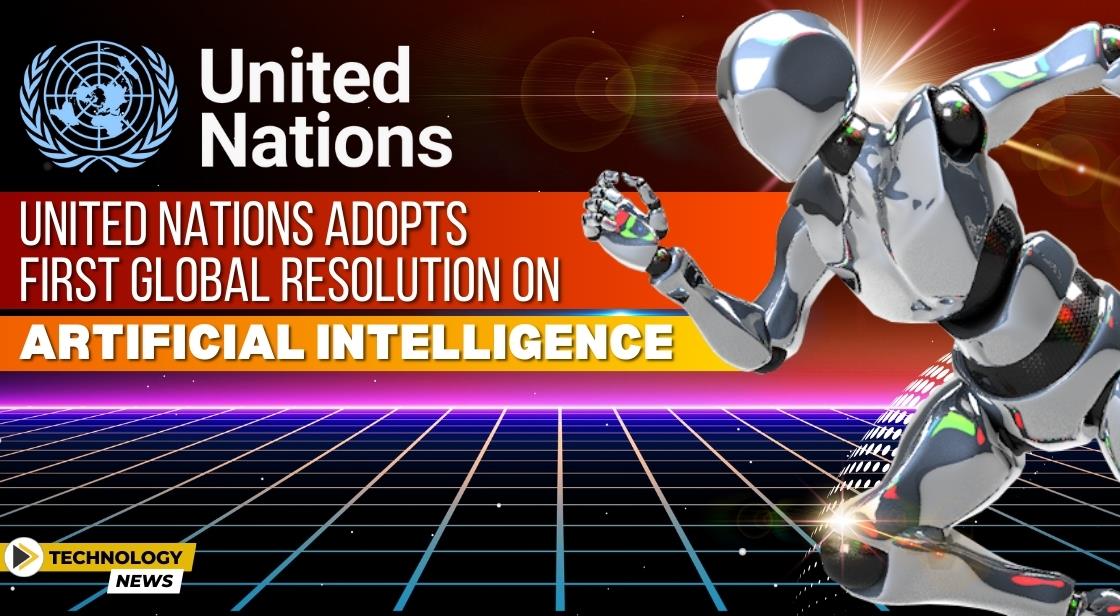United Nations Adopts First Global Resolution on Artificial Intelligence

News Synopsis
The United Nations General Assembly has taken a historic step towards shaping the future of artificial intelligence (AI). On Thursday, all 193 member states unanimously adopted the first-ever global resolution on AI, promoting ethical development and responsible use of this powerful technology.
A Global Consensus on AI Governance: Protecting Human Rights and Privacy
This non-binding resolution, spearheaded by the United States and co-sponsored by over 120 nations, including China, outlines key principles for responsible AI development. It emphasizes the importance of:
-
Safeguarding Human Rights: The resolution highlights the potential risks posed by AI to human rights and fundamental freedoms. It calls on member states to ensure that AI systems are designed, developed, and deployed in a way that upholds human dignity and protects basic rights.
-
Protecting Personal Data: The resolution recognizes the importance of robust privacy protections in the age of AI. Member states are encouraged to strengthen privacy policies and regulations to safeguard personal data collected and used by AI systems.
-
Monitoring AI for Risks: The resolution acknowledges the potential risks associated with AI, such as algorithmic bias, job displacement, and misuse by malicious actors. It encourages member states to proactively monitor AI for potential harms and develop mitigation strategies.
This resolution marks a significant step towards establishing a global framework for responsible AI development.
A Race to Regulate AI: The Global Landscape
The UN resolution on AI is part of a broader trend of governments around the world grappling with the need to regulate AI. Concerns about the potential negative impacts of AI are driving this push for regulatory frameworks:
-
Disruption of Democratic Processes: There are fears that AI could be used to manipulate elections, spread disinformation, and undermine democratic institutions.
-
Turbocharged Fraud: AI could be employed to automate and amplify existing fraud schemes, posing a significant threat to financial security.
-
Job Losses: The increasing automation capabilities of AI raise concerns about widespread job displacement across various sectors.
The resolution acknowledges these concerns and emphasizes the need for responsible AI development that prioritizes the well-being of citizens.
The Global AI Landscape: A Race for Supremacy
While the UN resolution promotes international collaboration, there is also an undercurrent of competition between major powers in the field of AI development:
-
Europe Forges Ahead: The European Union (EU) has been a leader in AI regulation, with lawmakers adopting a provisional agreement this month to oversee the technology.
-
US Struggles with Internal Politics: Despite the Biden administration's efforts to push for AI regulation, a polarized US Congress has made little progress.
-
China and Russia: Exploring AI for Diverse Purposes: Both China and Russia are actively developing and deploying AI tools for various purposes, including national security and economic development. However, concerns exist regarding their potential use for surveillance and information warfare.
While the UN resolution provides a valuable starting point, the complex geopolitical landscape surrounding AI development presents challenges for true international cooperation.
Statement from U.S. Ambassador to the United Nations
U.S. Ambassador to the United Nations, Linda Thomas-Greenfield, hailed the adoption of the resolution as a pivotal moment in AI governance. She emphasized the importance of global cooperation in guiding the development and usage of AI technologies, stating, "Today, all 193 members of the United Nations General Assembly have spoken in one voice, and together, chosen to govern artificial intelligence rather than let it govern us."
Looking Forward: A Baseline for Responsible AI Development
The UN resolution, though non-binding, offers a crucial foundation for future discussions on AI governance. As U.S. National Security Advisor Jake Sullivan stated, it provides "a baseline set of principles to guide next steps in AI's development and use." This resolution serves as a call to action for governments, tech companies, and civil society organizations to collaborate in developing and implementing responsible AI practices.
Conclusion
The adoption of the first global AI resolution by the United Nations marks a significant step towards establishing comprehensive governance frameworks for AI technologies. As the world grapples with the opportunities and challenges posed by AI, international cooperation and dialogue will be crucial in ensuring the responsible and ethical development and usage of AI systems.









